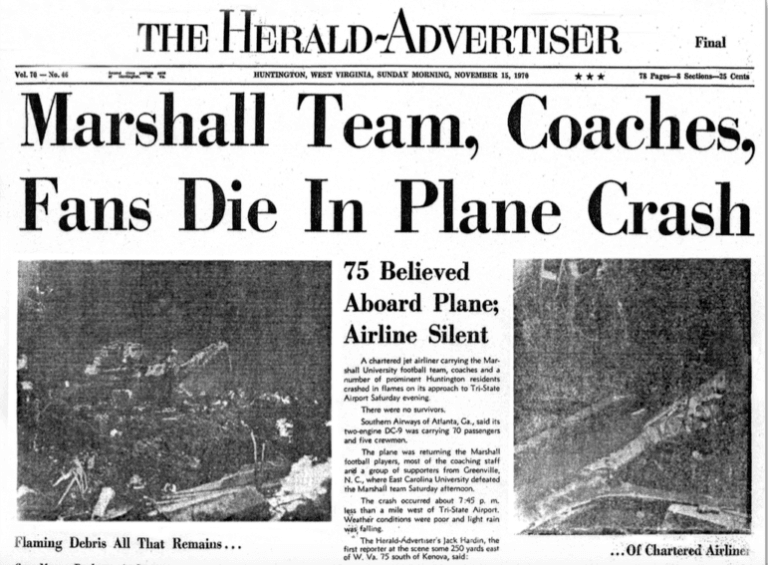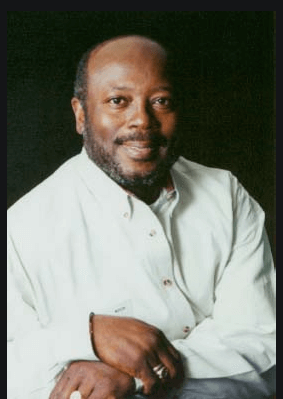

Newspapers.com
Front page of the Huntington, W.V. Herald-Advertiseer on Nov. 15, 1970.
It was 50 years ago last week the college football world took a long timeout to grieve. The charter plane carrying the Marshall football team home from a game at East Carolina on Nov. 14, 1970, crashed and burned about a mile from the strip where it was supposed to land in Huntington, W.Va.

And here’s something I never knew until Sunday: That same plane, a Southern Airways charter jet, was supposed to pick up the Mississippi State football team later that night in Baton Rouge to return the Bulldogs home from a game at LSU.
“We waited and waited and waited; that plane never came,” said Jackson dentist Lewis Grubbs, a star sophomore halfback on that 1970 Mississippi State team.
The plane, a Southern Airways two-engine DC-9, was carrying 70 passengers and a five-person crew. All perished in the crash. Investigators determined the cause of the crash was either pilot error or instrument panel malfunction.
As with those in most of the country, State players had heard the horrible news of the Marshall team crash, which occurred at just about the time their own game with LSU was beginning. They did not know that the crashed plane was supposed to be their plane until well into their airport wait. Coach Charles Shira gathered the team and explained the situation to them while Southern Airways searched for another plane.
Older folks may remember that the Marshall team crash was the second football-related air tragedy of the 1970 season. On Oct. 2 of that year, a plane carrying members of the Wichita State team crashed in Colorado, killing 31 of 37 on board.
The Marshall crash was more deadly and is the one more remembered. A documentary and an acclaimed movie, “We Are Marshall,” was made, the latter starring Matthew McConaughey.

Says Grubbs, “I don’t see how anyone can watch that movie with dry eyes.”
Grubbs, a Prentiss native, was working toward his own pilot’s license at the time.
“So I knew something about flying, including all the statistics about how much safer it was getting on an airplane that getting into your car,” Grubbs said. “Still I was like everybody else that night. I had serious reservations about getting on the plane.”
Grubbs remembers one funny part of the entire episode. “They opened up the canteen at the airport and let us get whatever we wanted to eat and drink,” he said. “We had some fans with us and one of them – he was a judge I think – found the liquor cabinet. He told us he wasn’t going to get on any plane sober that night, and he made darn sure he didn’t. No way he ever knew he got on that plane or got off.”
Larry Templeton, who was a sports information assistant who would go on to become the school’s athletic director, was on the flight as well.
“That’s been a long, long time, but I remember how somber the mood was waiting for the flight and then how quiet it was on the plane,” Templeton said. “And I remember a couple players who had been really scared riding back in a car with the highway patrol men who had been with us for the game.”
Says Grubbs, who really was a running back, “LSU had popped us pretty good. We had beaten Oklahoma State and Georgia and we would beat Ole Miss. We had a winning record. But I do remember that all the sudden none of that mattered very much. I remember that I just sat there and thought about how an entire football team, one just like ours, had been killed in an instant. All those young people with a whole life in front of them. I still think about it every time I see a Marshall score.”
•••
Twenty-one years after the Marshall tragedy, I was speaking with Nate Ruffin, who was then of the human resources director of The Clarion Ledger, where I worked at the time. During the course of conversation, Ruffin, since deceased, told me that he was a captain of that 1970 Marshall team. He would have been on that disastrous flight if not for an injury that caused him to miss the trip.
After the tragedy, Ruffin manned the phones in the Marshall athletic department, delivering the news to families of his friends. He attended funerals and memorial services in eight states. He then played on the 1971 Marshall football team, highlighted in the movie, that heroically won three games.

Worst assignment of all: Ruffin was asked to help identify bodies at the morgue.
“These people, these big, strong young men, were shrunken to the size of dolls,” Ruffin told me.
Ruffin identified his best friend from the jewelry he wore.
For Ruffin, nightmares continued for years. Strangely, he felt guilty. “Why them? Why not me? It makes no sense but you tell yourself: I should have been on that plane.”
Ruffin told me he spent a dozen years numbing himself with alcohol and drugs before coming out of that dark period while making a speech at a memorial to his fallen teammates. For the first time since the tragedy, he said, he bared his soul, wept openly. It was a spiritual cleansing and healing, he said.
He spent most of the rest of his life helping other people.
Nate Ruffin was a big, friendly guy — solid as a rock. He died in 2001, a victim of leukemia. He is buried in Huntington beside six of his teammates — six who could not be identified.
The post Marshall plane crash still resonates 50 years later, especially at Mississippi State appeared first on Mississippi Today.
- Jackson officials back House proposal to create new water utility board, despite some locals’ concerns - February 16, 2026
- Speaker Jason White: House ‘not afraid’ of school choice special session - February 16, 2026
- ‘Primary Trust’ at New Stage has a message for this moment - February 16, 2026